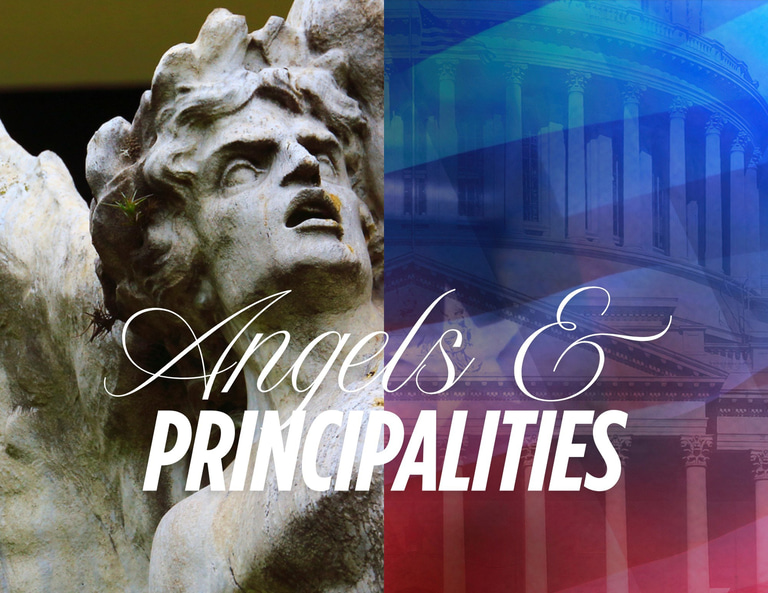Frank DuNN: Conversations at the junction of faith and politics
All My Weariness
Tired of all the mess, I need more than a break. I need something to sustain me. Maybe you do too.
Frank Dunn
8/29/20257 min read


“I’m tired.”
“Why are you tired?” Joe asked me.
“I’m not physically tired. In fact, I enjoyed my walk this morning. I’m just worn out with all the yow-yow, name-calling, breathless requests for contributions to political campaigns, cultural commentary, and the constant onslaught of terrible news. I’m just plumb worn out.”
I know, I know. Tune it out. Get out. Give it a rest. Take a break.
I just did that for a whole weekend. We went on our annual late summer camping trip up to the San Bernardino mountains. We were there with a hundred or more other men who enjoy a variety of totally optional things, some staying for the better part of two weeks and others for shorter times, like the weekend we just spent. I unplugged from almost everything. No letter writing. Very little news. And obviously no blogging or podcasting. I offer that in evidence that I’m not entirely cavalier about self-care.
Yet, I’ve been home a mere three days and am feeling as if all the restorative value of the vacation, not to mention the marvelous trip to Utah visiting Zion and Bryce Canyon national parks two weeks ago, is now depleted, leaving me dazed at the very idea of re-entry into the fray.
And fray it is. Just last night a Washington, DC, friend wrote that he and his husband had witnessed an ICE raid in Mount Pleasant (a neighborhood just blocks away from where we lived for 16 years) while neighbors protested in the streets. A recent letter from my former parish In DC asked for donations to support those who are scared to death after ICE showed up at the church capturing people leaving Loaves and Fishes, the parish’s signature hot meal program, and hauling them away.
All that is close to home even though I’m in California. As you know, it’s happening here as well.
And Social Security data bases have been raided. And the CDC is under attack. And NIH. And USAID (what’s left of it). And veterans. And the takeover of Union Station, the main ground transportation hub in Washington. And Chicago is threatened with needless and unlawful occupation. And Texas has gerrymandered its already gerrymandered congressional districts. And California is fighting back. And ActBlue is under attack. And rural hospitals are beginning to close. And CPB funding as been cut. And on. And on. And on.
Sorry if you are now as sick and tired as I am.
But the question remains: now what?
When any of us is under stress, our tendency is to revert to whatever responses we know best and have used most often. Frequently they are not the responses that would serve us most effectively.
In the case of the Church—I’m talking about the American churches, what used to be known as the “mainline” churches, and I might add significantly “white” churches—what we know best is how to comfort and reassure people. Many of us have been schooled to keep politics out of the pulpit. Back in the high days of the civil rights struggles in the 50’s and 60’s, only courageous preachers dared mention civil rights during Sunday worship in white Southern Protestant churches. In the divisive days of the Viet Nam War, only the brave dared speak in other than generic terms about the war.
We didn’t want to offend.
If we were in the pews, we didn’t want to be offended.
I cannot draw a cause-and-effect line from all that dodginess to the level of cultural impact that “mainline” churches have today, but I suspect that we have gotten so used to colluding with culture under the guise of “being pastoral,” offering support and comfort that the culture has long since tuned us out. We’re about as relevant to the general population as the “legacy media” are in a culture that finds its news and gets its inspiration from testimonials on TikTok and tweets on X and BlueSky.
Frankly, I’m not so much interested in getting the Church to become more popular. I am very much interested in the Church articulating the gospel in ways that unmistakably align with Jesus’ teaching.
I’m not suggesting that no one is being prophetic these days. Take for example Pope Leo. In his brief papacy, Leo XIV has already spoken out with clarity. It’s too soon, in my opinion, to claim that he is a model to follow, but I am impressed by what he has done in a few months. For example:
• He has shown a commitment to social justice by focusing on the dignity of the human person and the rights of workers. He has highlighted the need for a living wage, the right to form labor unions, and the protection of vulnerable people.
• Even before becoming pope, he had already criticized anti-immigration policies and specifically condemned the use of Christianity to justify harsh policies towards immigrants.
·•As pope, he has made symbolic gestures that suggest a global focus, such as speaking in Italian, Spanish, and Latin, but not English, in his first public appearance. He identifies more with people of the global south.
• Pope Leo has called for communication that is “capable of listening” and has encouraged people to turn away from the “contempt” and “hatred” that have become normalized in society.
• He has emphasized the importance of a free press.
• While his statements and actions have been interpreted as critical of the Trump administration, he has not presented his pontificate as a direct political opposition to a specific political leader or movement. Instead, he is focused on a constructive, yet critical, dialogue with the U.S. administration and other world leaders.
None of that is radical. Arguably, it has relatively little effect on some of the more dastardly moves of the authoritarian government we now have. But the mission of the Church has never been tied to measurable effectiveness, but rather to the Vision of God as the Church understands, curates, and implements that Vision: that all people be restored to unity with God and each other in Christ.
I can get on board with the words “all people” by understanding that “Christ” is not the surname of Jesus but rather the universality of Truth, Justice, and Love incarnated in Jesus. For those who seek and find God in other ways, I understand “Christ” as a cosmic, not just a historical, reality.
That leads me to understand that Christians do not have to be partisan, or triumphalist, or exclusionary, or self-aggrandizing, or narrow-minded, or haughty when we boldly work for universal peace, justice, and love. To my mind, we don’t need to push a program but rather invite, respect, and honor people instead of bamboozling, dictating to, or manipulating them.
Is all this blatantly obvious?
I guess it’s not. Because we church people, especially we white church people, surely have ignored it for a very long time. Over and over, we have interpreted the missionary thrust of the church to be remaking cultures in the image of the Western societies our missionaries have (mostly) come from. Repeatedly we have equated our social norms and conventions with the Will of God. Some of the worst and most atrocious examples of our efforts to shape societies include the treatment of Native Americans by Christians like Junipero Serra (recently canonized) who ripped away their identities, effectively enslaving them while hanging what was left of their souls in the baking sun to wither.
Would that that were an isolated example.
I fail to understand how the Church can continue to be so dense as to ignore the disparity between such atrocities and the person and teaching of Jesus. Of course, I can and do look at figures from the past, including the more recent past, and see how otherwise good and well-intentioned men and women can be wrong-headed. In my view, ranting about what the 21st century liberal judges as their downfall does little good. What’s done is done. Pointing out the sins of past generations has its place and is a serious matter. But even more serious is what we can do now. We can say loudly and clearly to those who follow in their wake, “No! Stop! Treating people with cruelty; ignoring the plight of the poor; preying on the helpless; deceiving the gullible: all this is wrong. And it must end.”
We could thumb through pages and pages of history looking at the pogroms, the genocides, the enslavements, that we Christians been party to. Yet I’d add one more. The biggest sellout of them all has been the Church’s wedding to capitalist “ethics.” I’m not naïve enough to suppose that the Church can behave as if we weren’t thoroughly embedded in a money-driven world. But how about becoming conscious enough and honest enough to own the tension between the gospel and our capitalist values openly? Can we not talk about the tensions of living in the gray zone between capitalist reality and gospel values? And can we not blow the whistle on those who, to quote the Prophet Amos [8:4-6], “trample on the needy, buying the poor with silver and the needy for a pair of sandals, selling even the sweepings with the wheat?” Is this an abstraction that deserves an occasional sermon on economic justice that goes in one ear and out the other, or is it an emergency unfolding in the political nightmare of what we call America the Beautiful?
For the record, I’m not sure the Church is any less moral today living in a capitalist society than it was in the Middle Ages living in a feudal one. We’ll never be perfect. That’s why one of the best pieces of Good News we have is the practice of confessing our sins, examining our consciences, owning our own helplessness, believing in an understanding and compassionate Savior, a God who forgives and restores.
And maybe that’s the gospel for a guy who’s tired. Tired and sick of all the mess, and frankly flummoxed by what seems to be an increasingly arduous task of addressing it. Still, I choose to throw down the gauntlet and not throw in the towel. And when at times the darkness deepens and breath feels a little cramped (to say the least), I hum old lines that sustain me, lines about a Love that will not let me go, in whom I rest my weary soul.
Sounds antithetical, doesn’t it? Like a retreat from battle? Like a capitulation to pietism? Maybe so. But, confound it, if that’s what it takes before I get a second wind so I can go overturn some tables and grab some whips (verbal in my case) to chase the moneychangers and the liars and those whose heels are on the necks of weak, then I accept.
Who’s with me?
